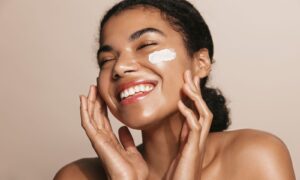Are you tired of chasing the elusive dream of perfect pores?
Countless skincare products promise to shrink, tighten, or close those pesky openings on our skin.
But what if we told you that the concept of opening and closing pores is nothing more than a myth perpetuated by the beauty industry?
In this article, we delve into the fascinating world of skincare for pores, debunking common misconceptions and shedding light on the truth behind pore size and function.
Get ready to uncover the secrets that will revolutionize your approach to skincare and leave you pore-ly informed!
What are pores?
Pores are small openings on the skin’s surface that are crucial to maintaining skin health.
They serve as pathways for sweat and oil to reach the skin’s surface, helping to regulate body temperature and keep the skin hydrated.
However, when pores become clogged with excess oil, dirt, and dead skin cells, they can appear enlarged and lead to various skin issues such as acne and blackheads.
Taking care of your pores is essential for maintaining healthy-looking skin.
Additionally, incorporating ingredients like salicylic acid and retinol into your skincare regimen can help unclog pores and promote cell turnover, resulting in smoother, clearer skin.
Understanding your skin type is vital to effectively caring for your pores.
Oily or combination skins may require different techniques than dry or sensitive skins.
The science behind pore size
When it comes to pore size in the context of skincare, a few fundamental scientific principles apply.
Pores are tiny openings on our skin that allow sebum (natural oil) production and sweat to reach the surface.
One exciting aspect of pore size is that while you can’t actually change the size of your pores, you can help minimize their appearance through proper skincare practices.
For example, keeping your skin clean and well-moisturized can prevent pores from enlarging due to clogging or dryness.
Additionally, incorporating ingredients like niacinamide or retinol into your skincare routine can help improve overall skin texture and reduce the visibility of pores.
Understanding the science behind pore size can empower individuals to make informed decisions about their skincare regimen.
By focusing on maintaining skin health and utilizing products tailored to address specific concerns related to pore size, you can effectively manage this aspect of your overall complexion.
A holistic approach combining science-backed knowledge with personalized skincare practices is critical to achieving smoother, more radiant skin.
Common misconceptions about pores
One common misconception about pores is that they can change size.
In reality, as we mentioned, pore size is primarily genetic and determined by factors such as age and skin type.
While you can’t permanently shrink pores, you can help minimize their appearance through proper skincare practices.
Another misconception is that only those with oily skin have noticeable pores.
However, people with dry or combination skin types can also have enlarged pores due to a build-up of excess oil and dead skin cells.
Remember, pore size is not the end-all-be-all of beauty – healthy, glowing skin comes in all sizes!
Can you really open and close pores?
Many skincare products claim to open or close pores, but pores cannot physically change size.
Once again, pore size is genetic, primarily determined by age and skin type.
However, we can take steps to minimize the appearance of pores by keeping them clean and free from debris.
This involves proper cleansing, exfoliating, and using non-comedogenic products to prevent clogging.
While we can’t alter pore size permanently, certain ingredients like salicylic acid and retinoids can help improve the overall appearance of pores by reducing oil production and promoting cell turnover.
It’s essential to recognize that achieving perfectly flawless skin without visible pores may not be realistic for most people.
Embracing our natural skin texture and focusing on a consistent skincare routine tailored to our specific needs can significantly affect how our pores look and feel.
By understanding the limitations of pore size manipulation, we can set more realistic expectations for our skincare journey.
Rather than obsessing over opening or closing pores, it is more beneficial to focus on maintaining healthy skin through proper care and nourishment.
By adopting a holistic approach to skincare that prioritizes gentle cleansing, regular exfoliation, hydration, and sun protection and using targeted treatments when necessary, we can achieve a balanced complexion that glows from within.
Remember that perfect skin doesn’t mean poreless skin—confidently embracing your natural beauty is critical to achieving radiant and healthy-looking skin.
Skincare tips for healthy pores
To maintain healthy pores, incorporate gentle exfoliation into your skincare routine.
Opt for products with salicylic acid or gentle physical exfoliants to unclog and minimize pores.
Over-exfoliation can strip the skin barrier, leading to pore congestion, so aim for 1-2 times per week.
Incorporate niacinamide into your routine to regulate sebum production and reduce the appearance of enlarged pores.
Niacinamide is known for strengthening the skin barrier and improving overall skin texture, making it an essential ingredient in any pore-focused routine.
Finally, make sure to keep your skin hydrated by using a lightweight moisturizer daily.
Hydrated skin helps maintain optimal pore health and prevents excess oil production that can lead to clogged pores.
Remember – healthy pores are happy pores!
Embrace your natural skin.
The belief that pores can be opened and closed is a myth perpetuated by misinformation.
Pores do not have muscles to contract or expand, so they cannot be manipulated that way.
Instead, proper skincare routines and treatments can help to keep pores clean and minimize their appearance.
Let’s focus on evidence-based skincare practices rather than chasing after false promises of pore-shrinking products.
Embracing our skin’s natural biology and taking care of it with proven methods will improve overall skin health in the long run.



